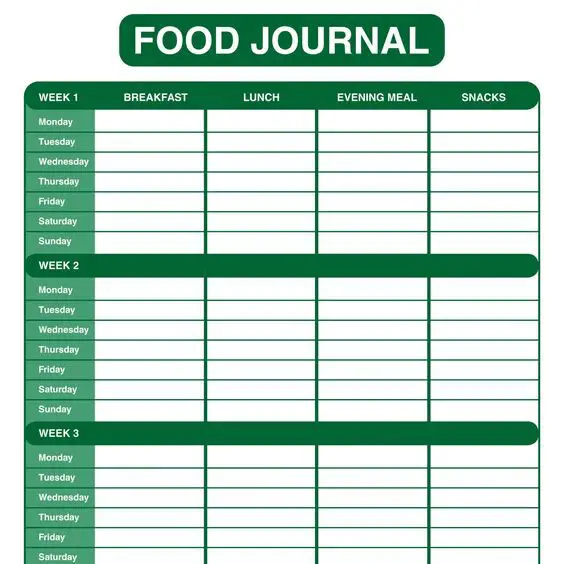Losing weight is a goal that resonates with a large portion of the population.
The desire to shed excess pounds is often driven by the numerous health benefits that come with maintaining a healthy weight.
From reducing the risk of chronic diseases like heart disease and diabetes to improving overall physical and mental well-being, there are compelling reasons to embark on a weight loss journey.
Busy? Save this pin for later.
1. Mindful Eating for Weight Loss
Mindful eating has gained significant attention in recent years as a powerful tool for weight loss and overall well-being.
In a world that is constantly buzzing with distractions, taking the time to be present and fully engaged in our meals can make a world of difference in our relationship with food.
The concept of mindful eating revolves around being aware of what and how we eat. It encourages us to slow down, savor each bite, and truly appreciate the nourishment that our food provides.
By doing so, we become more attuned to our body’s hunger and fullness cues, allowing us to make better-informed decisions about when to eat and when to stop.
When we engage in mindful eating, we create a space for ourselves to truly experience the flavors, textures, and aromas of our food.
We begin to appreciate the effort that goes into preparing a meal and the nutrients it provides our bodies.
This heightened awareness can lead to a deeper sense of satisfaction and fulfillment from our meals, reducing the need for mindless snacking or overeating.
Distractions, such as television or smartphones, can hinder our ability to fully engage in the act of eating.
They take our focus away from the present moment and encourage mindless consumption.
2. Regular Exercise for Weight Loss
When it comes to losing weight, regular exercise is a crucial component of any successful journey.
The benefits of exercise extend far beyond just burning calories. Engaging in physical activity on a regular basis can boost your metabolism, enhance overall fitness, and contribute to long-term weight loss and weight maintenance.
Health experts recommend aiming for at least 150 minutes of moderate-intensity exercise or 75 minutes of vigorous-intensity exercise per week.
This guideline ensures that you are getting enough physical activity to support weight loss and promote overall health.
Your exercise routine should include a combination of cardiovascular activities, strength training, and flexibility exercises.
Cardiovascular exercises, such as running, cycling, or swimming, get your heart rate up and help burn calories.
Strength training exercises, such as lifting weights or using resistance bands, build lean muscle mass, which increases your metabolism and helps burn more calories even at rest.
Flexibility exercises, such as yoga or stretching, improve mobility and prevent injury.
3. Balanced Diet for Weight Loss
Achieving and maintaining a healthy weight is not just about exercise, but also about making wise dietary choices.
To support your weight loss goals, it is important to embrace a balanced diet that is rich in fruits, vegetables, lean proteins, whole grains, and healthy fats.
These foods not only provide essential nutrients but also help keep you feeling full and satisfied throughout the day.
Fruits and vegetables are packed with vitamins, minerals, and fiber, which are important for overall health and can aid in weight loss.
They are also low in calories, making them a great choice for filling up your plate without adding excess calories.
Including a variety of colorful fruits and vegetables in your daily meals can ensure that you get a wide range of nutrients.
Lean proteins, such as chicken, fish, tofu, and legumes, are vital for building and repairing tissues, as well as for maintaining muscle mass.
Protein-rich foods can help you feel satiated and prevent overeating.
Whole grains, such as brown rice, quinoa, and whole wheat bread, are high in fiber and provide a steady source of energy.
They can also help regulate blood sugar levels and contribute to a feeling of fullness.
Healthy fats, such as those found in avocados, nuts, and olive oil, are important for brain function, hormone production, and nutrient absorption.
4. Portion Control for Weight Loss
Portion Control for Weight Loss Controlling portion sizes is a key strategy for effective weight management.
Use smaller plates and utensils to help you naturally reduce your portions. It’s also crucial to listen to your body’s hunger and fullness signals.
Eating smaller, more frequent meals throughout the day can prevent excessive calorie intake and help curb hunger.
Portion control is a fundamental aspect of successful weight management. By being mindful of the sizes of the portions we consume, we can take charge of our eating habits and achieve our weight loss goals.
There are several strategies that can aid in controlling portion sizes and promote effective weight management.
One effective strategy is to use smaller plates and utensils. Research has shown that using smaller plates can trick our minds into perceiving larger portions, leading to a sense of satisfaction with less food.
Using smaller utensils can also encourage slower eating, giving our bodies time to register feelings of fullness.
Another important aspect of portion control is listening to our body’s hunger and fullness signals.
Paying attention to our body’s cues can help us avoid overeating and prevent excessive calorie intake.
It is essential to eat when we are genuinely hungry and stop eating when we feel comfortably satisfied, rather than eating until we are overly full.
5. Adequate Hydration for Weight Loss
Adequate hydration is a crucial yet frequently overlooked aspect of weight loss. Many people focus solely on diet and exercise while neglecting the importance of staying properly hydrated.
However, drinking an adequate amount of water throughout the day can have a significant impact on controlling appetite and preventing overeating.
One of the key benefits of staying hydrated is its ability to help control appetite.
Often, we mistake thirst for hunger, leading us to reach for snacks or larger portion sizes when our bodies are actually in need of hydration.
By sipping on water when we feel hungry, we can determine if our body is truly craving food or if it simply requires hydration.
This simple act of drinking water before reaching for a snack can help prevent unnecessary calorie intake and support weight loss efforts.
Moreover, water is a calorie-free beverage that keeps the body hydrated. By choosing water over sugary drinks or calorie-laden beverages, we can avoid consuming unnecessary calories that can hinder weight loss progress.
Water not only quenches our thirst but also supports various bodily functions, including digestion and metabolism. Proper hydration ensures that our body’s systems are functioning optimally, which can aid in weight loss.
6. Get Enough Sleep for Weight Loss
The importance of getting enough sleep for weight loss cannot be overstated. While it may not be immediately apparent, there is a strong link between sleep and weight that has a significant impact on our overall health and well-being.
One of the key factors that connects sleep and weight is the influence of sleep on hunger hormones.
When we experience poor sleep quality or suffer from sleep deprivation, it disrupts the delicate balance of our hunger hormones, particularly ghrelin and leptin.
Ghrelin, often referred to as the “hunger hormone,” increases when we are sleep-deprived.
This surge in ghrelin levels leads to heightened cravings, especially for high-calorie and sugary foods.
These intense cravings can be difficult to resist, making it more challenging to stick to a healthy eating plan and maintain a calorie deficit necessary for weight loss.
On the flip side, insufficient sleep also reduces leptin, the hormone responsible for signaling fullness.
When our leptin levels are low, our body doesn’t receive the proper signals that we are satisfied and full after eating.
This lack of satiety can result in overeating and consuming more calories than our body needs, which can sabotage our weight loss efforts.
Quality sleep is a non-negotiable aspect of a successful weight loss journey. Aim for 7-9 hours of uninterrupted sleep per night.
Poor sleep can disrupt your hunger hormones, leading to increased cravings and weight gain.
Prioritize sleep by creating a relaxing bedtime routine and ensuring your sleeping environment is conducive to rest.
7. Stress Management for Weight Loss
When we are stressed, our bodies release stress hormones like cortisol, which can have a profound influence on our metabolism and appetite.
Cortisol increases our cravings for high-calorie and sugary foods, often referred to as comfort foods.
These types of foods provide a temporary sense of relief and pleasure, but they can be detrimental to our weight loss efforts in the long run.
To combat the negative effects of stress on weight loss, it’s important to incorporate stress management techniques into our daily routine.
Practices like meditation, deep breathing exercises, or yoga can be incredibly beneficial in helping us relax and reduce stress levels.
These activities promote mindfulness and allow us to focus on the present moment, helping to alleviate stress and anxiety.
By effectively managing stress, we are less likely to resort to emotional eating as a coping mechanism.
Emotional eating is a common response to stress, where we turn to food for comfort or as a distraction from negative emotions.
The foods chosen during emotional eating are often high in calories and lacking in nutritional value, which can hinder our weight loss goals.
8. Keep a Food Journal for Weight Loss
When embarking on a weight loss journey, having a deep understanding of your eating habits is crucial for success.
One powerful tool that can provide invaluable insights is keeping a food journal.
This practice involves meticulously recording every bite, sip, and nibble that enters your mouth, providing a comprehensive account of your daily food intake.
Keeping a food journal goes beyond merely logging what you eat; it’s about delving deeper into your eating habits and uncovering patterns that may be hindering your progress.
By recording not only meals but also snacks and beverages, you gain a holistic view of your nutritional choices throughout the day.
The act of tracking your food intake can be eye-opening. It helps bring awareness to mindless eating, emotional eating, or excessive portion sizes that may have gone unnoticed otherwise.
By noting down every detail, you can identify triggers, such as stress, boredom, or specific situations, that lead to unhealthy food choices.
Armed with this knowledge, you can then develop strategies to address these triggers and make healthier choices in the future.
Keeping a food journal can be a valuable tool in your weight loss journey. It allows you to track your meals, snacks, and emotions associated with eating.
9. Seek Social Support for Weight Loss
Share your weight loss journey with friends, family, or consider joining a support group. Having a support system can provide motivation, accountability, and encouragement.
When you have others who understand your goals and challenges, you’re more likely to stay committed to your weight loss plan.
When you involve others in your weight loss journey, you create a network of support that can make a significant difference in your progress.
Friends and family members who are aware of your goals can offer words of encouragement, celebrate your achievements, and provide a listening ear when you face obstacles.
Their support can be a powerful motivator, helping you stay focused and determined.
Alternatively, joining a weight loss support group can offer a unique and valuable experience.
Whether in person or online, these groups consist of individuals who share similar goals and challenges.
Being part of such a community provides access to a wealth of knowledge, advice, and inspiration.
You can exchange tips and strategies, learn from each other’s successes and setbacks, and find solace in the shared experiences of others.
Consider joining a weight loss support group, either in person or online.
These groups often consist of individuals who share similar goals, making it a rich source of motivation and advice.
You can exchange tips, celebrate each other’s successes, and offer a listening ear when someone is facing challenges.
10. Set Realistic Goals for Weight Loss
Finally, setting realistic and achievable weight loss goals is essential. Instead of aiming for drastic changes, break your journey into smaller milestones.
Celebrate your successes along the way, no matter how small they may seem. Positive reinforcement can keep you motivated and committed to your weight loss journey.
Achieving and maintaining a healthy weight is a journey that requires dedication, commitment, and a set of effective weight loss habits.
It’s important to emphasize that these habits are not isolated; they complement and reinforce each other. When combined, they create a robust framework for sustainable weight loss.
Your journey should not be rushed but rather viewed as a marathon, where consistent, gradual progress is the key to long-term success.
Incorporating these habits into your daily routine can lead to transformative changes in your life.
You’ll not only see changes on the scale but also experience increased energy, improved mood, and enhanced self-confidence.
Your journey to a healthier you starts now, armed with these ten effective weight loss habits.
Embrace the challenge, stay committed, and revel in the positive transformations that await you on this empowering path.
Remember that your journey is unique, and every step you take brings you closer to your healthiest, happiest self.
Weight loss is not just about shedding pounds; it’s about gaining a more vibrant, fulfilling life. You have the tools; now, it’s time to embark on your transformative journey towards sustainable weight loss.












Leave a Reply